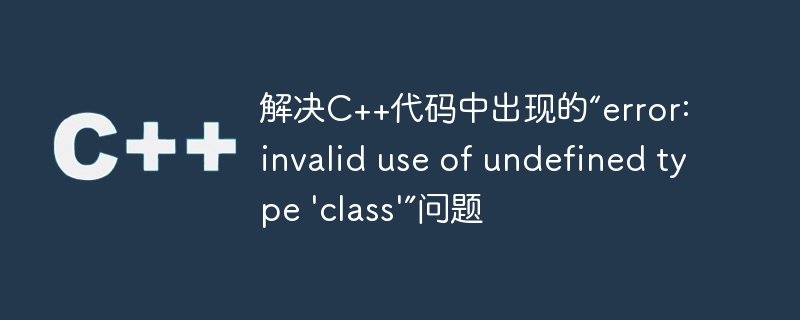Home >Backend Development >C++ >Solve the problem of 'error: invalid use of undefined type 'class'' in C++ code
Solve the problem of 'error: invalid use of undefined type 'class'' in C++ code
- WBOYWBOYWBOYWBOYWBOYWBOYWBOYWBOYWBOYWBOYWBOYWBOYWBOriginal
- 2023-08-26 13:58:512135browse

Solve the "error: invalid use of undefined type 'class'" problem in C code
In C programming, sometimes we will encounter this Compilation error message: "error: invalid use of undefined type 'class'". This error means that we are using an undefined class in our code.
This error usually occurs in the following situations:
- Forgot to include the header file of the class.
- The forward declaration of the class is incomplete.
- The definition of the class is after use.
- Circular dependency appears in the class definition.
To better understand and solve this problem, below we will detail each reason and provide corresponding code examples.
- Forgot to include the header file for the class
This is one of the most common reasons. When we use an object of a certain class or call its member function in a file, we must first include the header file of the class.
For example, we have a header file named "myClass.h", which defines a class named "myClass". Then use the object of this class in "main.cpp" and call its member functions. If we forget to include "myClass.h" in the "main.cpp" file, it will cause compilation errors.
Here is an example:
myClass.h:
#ifndef MYCLASS_H
#define MYCLASS_H
class myClass {
public:
void doSomething();
};
#endifmain.cpp:
#include <iostream>
// #include "myClass.h" // 忘记包含头文件
int main() {
myClass obj; // 编译错误:invalid use of undefined type 'class myClass'
obj.doSomething();
return 0;
}The solution is to include it in "main.cpp" Correct header file, that is, add a line of code: #include "myClass.h".
- The forward declaration of a class is incomplete
In some cases, we may only need to know the existence of a class without using its members. At this time, we can use the forward declaration of the class to solve the problem.
However, if the forward declaration is incomplete when using members of the class, a compilation error will occur.
Here is an example:
myClass.h:
#ifndef MYCLASS_H
#define MYCLASS_H
class myClass {
public:
void doSomething();
};
#endifsomeClass.h:
#ifndef SOMECLASS_H
#define SOMECLASS_H
class someClass; // 不完整的前向声明
class otherClass {
public:
void doSomethingWithSomeClass(someClass obj);
};
#endifsomeClass.cpp:
#include "myClass.h"
// #include "someClass.h" // 忘记包含头文件
void otherClass::doSomethingWithSomeClass(someClass obj) {
obj.doSomething(); // 编译错误:invalid use of undefined type 'class someClass'
} The solution is to include the correct header file in "someClass.cpp", that is, add a line of code: #include "someClass.h".
- The definition of the class needs to be after use
In C, the definition of the class needs to be before use. If we use the class first and then define it, we will get a compilation error.
The following is an example:
myClass.cpp:
#include "myClass.h"
void myClass::doSomething() {
// do something
}
void otherFunction() {
myClass obj; // 编译错误:invalid use of undefined type 'class myClass'
}The solution is to place the definition of the class before use, or place the declaration of the class before use.
- Circular dependencies appear in class definitions
If there are circular dependencies between two or more classes, the compiler will not be able to resolve the dependencies between them relationship, resulting in compilation errors.
Here is an example:
classA.h:
#ifndef CLASSA_H
#define CLASSA_H
#include "classB.h"
class classA {
classB obj;
};
#endifclassB.h:
#ifndef CLASSB_H
#define CLASSB_H
#include "classA.h"
class classB {
classA obj;
};
#endifThe solution is to try to reduce or eliminate the gaps between classes Circular dependencies, such as using forward declarations or reorganizing code structure. If circular dependencies cannot be avoided, consider using interface classes or pure virtual base classes to resolve dependencies.
Summary:
Through the above explanations and code examples, we can better understand and solve the "error: invalid use of undefined type 'class'" problem in C code. When formally writing code, we should pay attention to including correct header files, complete forward declarations, class definitions before use, and avoiding issues such as circular dependencies to ensure that the code can compile and run correctly.
The above is the detailed content of Solve the problem of 'error: invalid use of undefined type 'class'' in C++ code. For more information, please follow other related articles on the PHP Chinese website!
Related articles
See more- How to solve golang error: undefined type 'x', solution
- How to solve golang error: invalid use of 'x' as type U in slice literal
- How to solve C++ compilation error: 'invalid use of template-name without an argument list'?
- Solve the problem of 'error: invalid use of incomplete type 'class'' in C++ code
- How to solve golang error: invalid use of 'x' (type T) as type U in map index, solution steps

